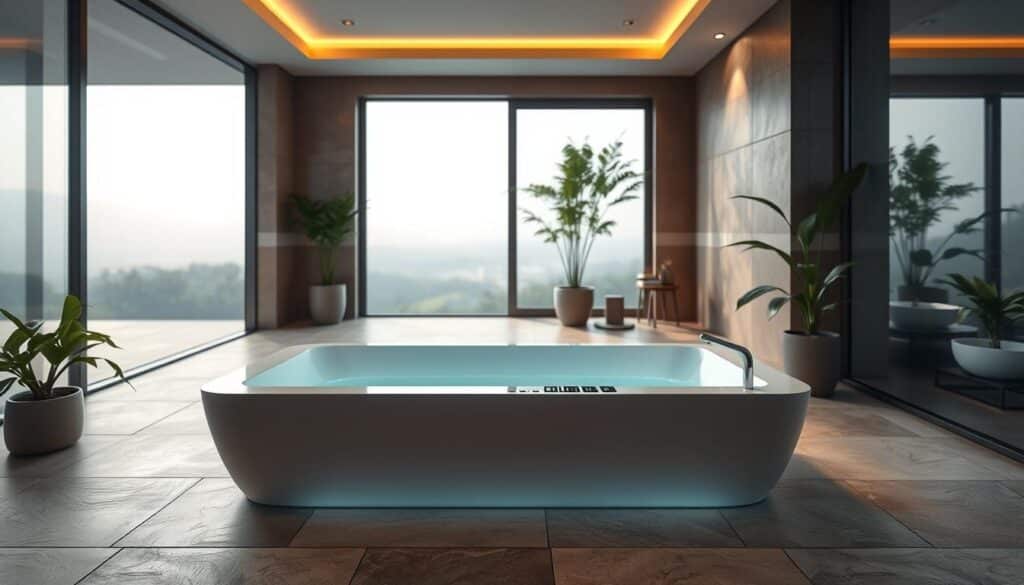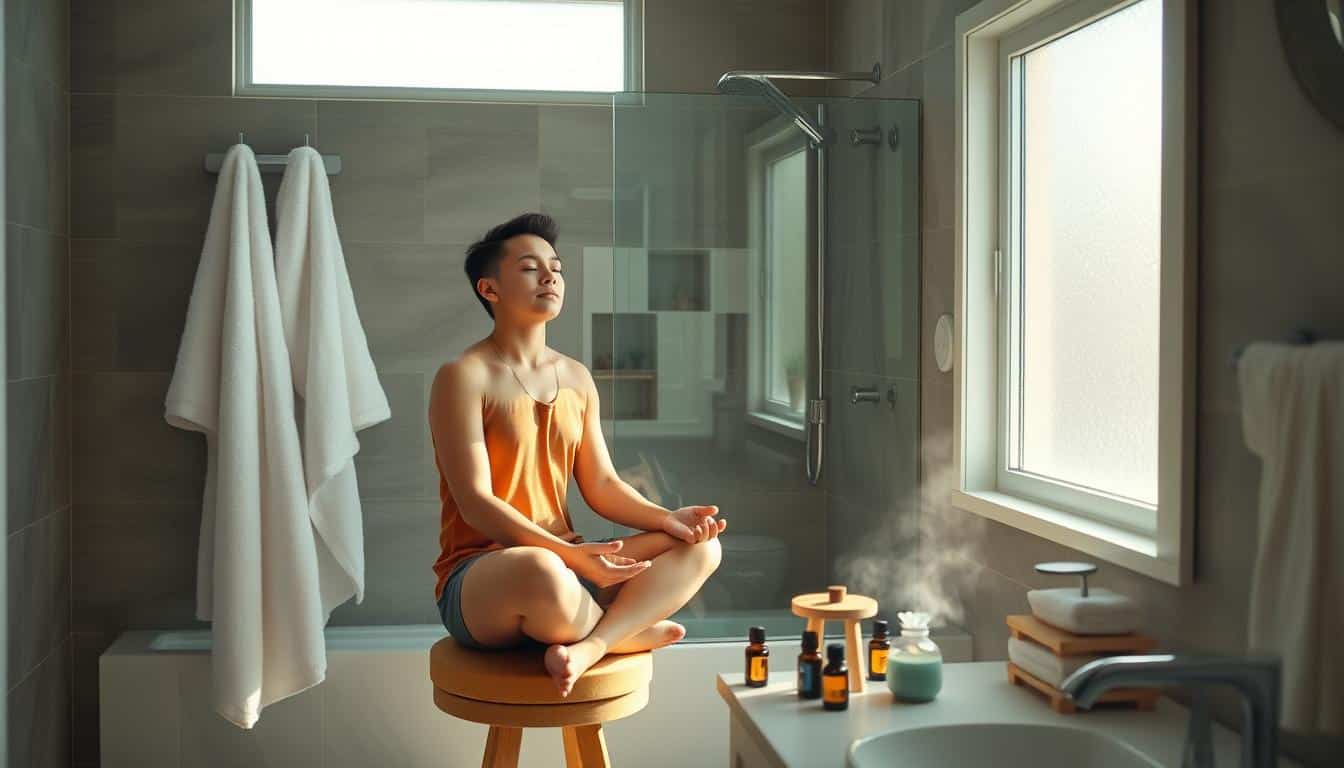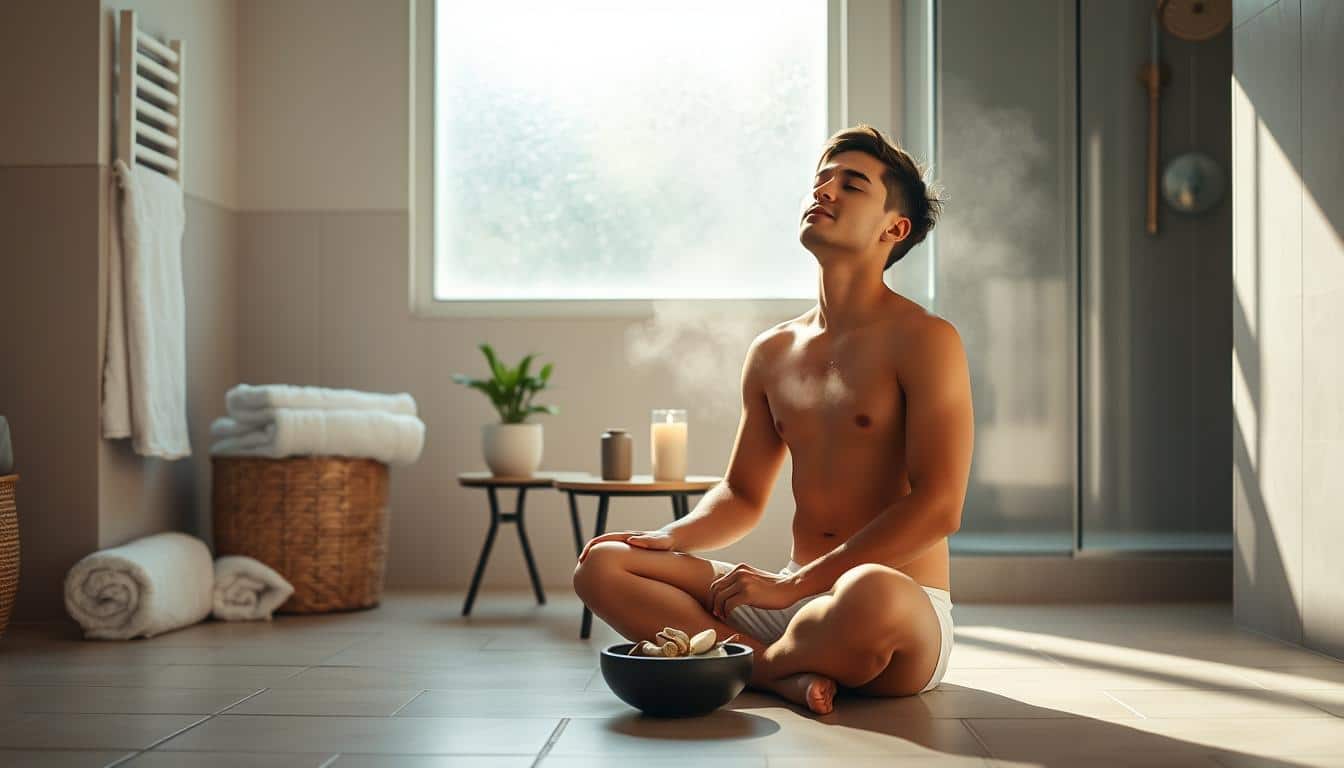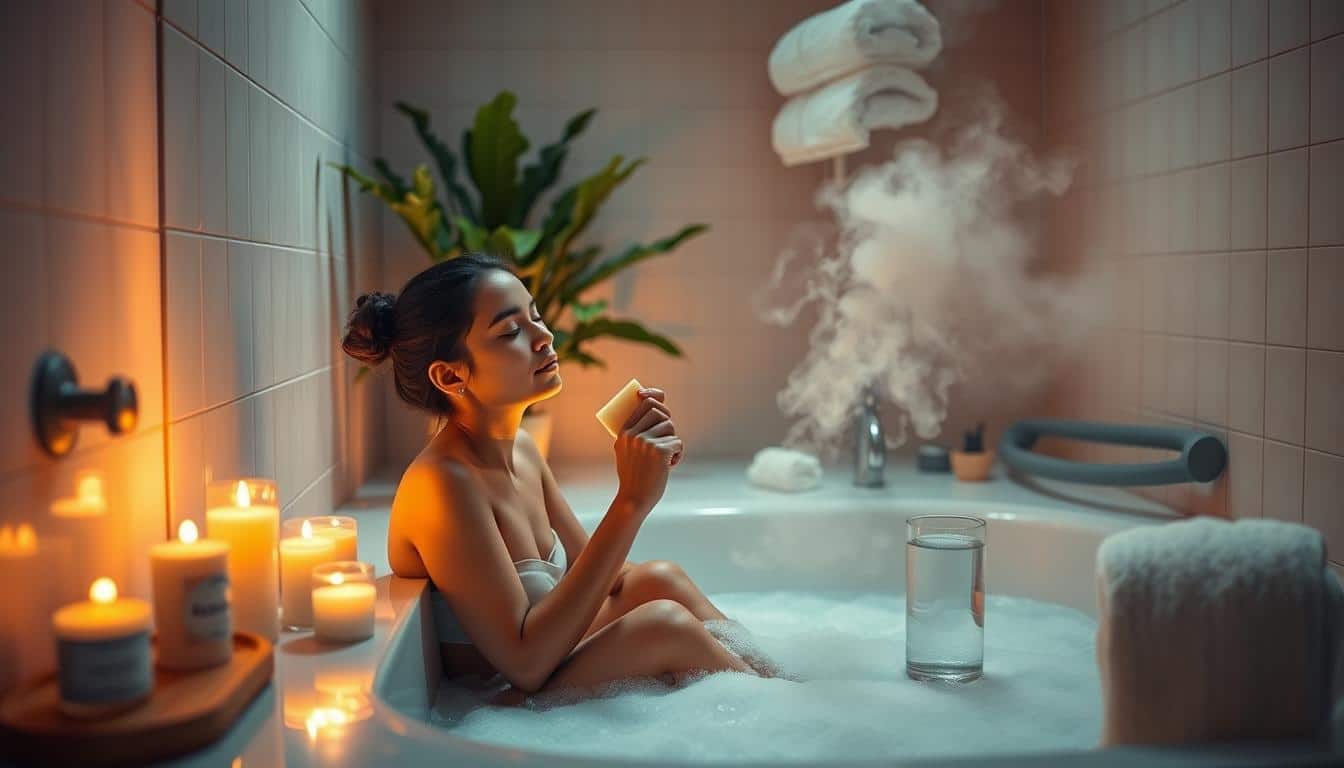It’s hard for parents to find time to relax, especially when showering. They carry a lot of responsibilities. This makes it important to use stress management techniques during shower time. Taking care of themselves in these moments can make everyone feel better.
This article talks about ways parents can feel more relaxed when they shower. It’s about making shower time a peaceful break. By looking after their own stress, parents can make home life calmer. This helps them support their kids better. Learn how to make the most of shower time for a quick refresh.
The Importance of Me Time for Parents
Me time is vital for parents to keep up their mental health. It helps among daily duties. Even a quick hot shower can boost emotional health. This break allows parents to recharge and avoid burnout.
Self-care does not have to be fancy or expensive. There are easy ways for parents to add it to their day. A hot shower can be a peaceful break. Lighting a candle can make it more relaxing. This me time lets parents appreciate calm moments.
Box breathing in the shower is a great way to relax. The steam helps too. Parents can also use this time for extra self-care, like skin care or hair treatments. This makes a shower feel like a spa. Such simple acts of self-care help keep families happy. When parents take time for themselves, they connect better with their kids.
Understanding Stress Triggers During Shower Time
Shower time can be a peaceful break for busy parents. Yet, it may also bring stress. Parents often think about unfinished chores and family duties during this time. The sound of water can also be too much, making anxiety worse.
Worrying about safety is a big deal, especially when you have kids. Parents fear slipping or getting water in their eyes. These worries might come from past bad water experiences. Some might remember falling or almost drowning, which makes showering stressful.
Using soaps and washcloths can also stress parents out. Feeling water on their skin and temperature changes can be uncomfortable. It’s important for parents to understand these feelings. This knowledge can help them feel less stressed during showers.
Stress Management Techniques for Parents During Shower Time
Shower time is perfect for parents to try stress relief methods. It’s a chance to take care of themselves and unwind. Just a few minutes focusing on now can really help reduce stress.
Mindfulness Practices to Incorporate
Mindfulness means focusing on the present, letting go of stress. While showering, parents can:
- Feel the water on their skin.
- Take slow, deep breaths.
- Smell the soaps and shampoos, using their senses.
These mindfulness steps can make shower time more relaxing. They help parents feel calmer and more refreshed.
Progressive Relaxation Techniques
Progressive relaxation also helps ease stress. It’s about tightening and then relaxing muscles. Here’s how parents can do it:
- Start with your feet: tense them, then release.
- Go up to your calves, thighs, and hips. Do the same thing.
- Then, move to your stomach, arms, shoulders, and neck. Finish with your face.
This approach not only eases body tension but also makes you feel peaceful. Doing this regularly can help parents manage stress better. It builds their ability to handle daily challenges.
Creating a Calming Environment
The surroundings heavily affect how parents handle stress. Turning your bathroom into a serene shower area can greatly better your alone time. Start by adding calming lights and soothing music. Try getting a Hib Ceiling Light that merges soft tunes with gentle light. It makes a peace-filled atmosphere for unwinding.
Bringing in natural smells like lavender or eucalyptus through your shower items invites calmness. These scents help make a relaxing zone. They’re good for easing stress at home. Also, keeping your shower spot neat and free from clutter makes it more calming.
Being prepared is key to keeping this serene setting. Get everything you need ready before you shower. This way, you can relax fully without looking around for things. Also, a visual countdown timer can let you know when your shower time is ending. It helps you smoothly come back to the real world.
Having a regular bath time routine is not just relaxing, it also teaches kids to be more independent. Adding fun bath toys or audiobooks can entertain your children. This lets you take a break and recharge. With these careful changes, parents can have real joy in their shower moments.
Establishing a Shower Routine
A good shower routine is key for parents needing a break in a busy home. It turns a normal shower into a special time for rest. This helps parents improve their daily care routine, getting ready mentally with joy and helping manage stress.
Benefits of Scheduling Alone Time
Adding a shower to a self-care routine helps with cleanliness and mind health. This alone time is like a safe space, helping parents to:
- Feel refreshed and manage stress better.
- Show the value of self-care to themselves and their kids.
- Feel ready and less stressed when going back to family tasks.
By making a shower routine, parents show how crucial *me time* is. This leads to a happier family life.
Using Visualization Techniques for Relaxation
Visualization helps parents ease stress, especially during showers. It transports them to calm places like serene beaches or peaceful gardens. The brain thinks these imagined spots are real, helping forget daily stress.
The “safe place visualization” is a strong method. Parents can imagine a comforting place with their eyes closed. The sound of water and warmth from the shower feel like ocean waves and sunlight. These methods boost well-being and confidence, making life’s challenges easier.
Adding meditation to shower time works too. Parents can picture a colorful escalator, which helps relax deeper. Body scan meditation teaches to notice and release body tension. With regular practice, a 20-minute session can shrink to just 5 minutes.
It’s important to use visualization every day, especially since 18.1% of U.S. adults battle anxiety yearly. A few moments of visualization during showers can improve sleep and reduce stress. With daily effort, parents can create a peaceful space in their minds, helping cope with a busy life.
Implementing Deep Breathing Exercises
Deep breathing helps parents manage stress, especially during shower time. The 4-7-8 technique is simple: breathe in for 4 counts, hold for 7, then exhale for 8. This method relaxes both your body and mind.
It balances your nervous systems, reducing stress. You can do it anywhere, even in the shower, without any special tools. Adding deep breathing to your daily life brings calmness.
Studies show the 4-7-8 technique lowers stress and anxiety. Just a few minutes of deep breathing can help parents a lot. It makes you more aware of the moment, aiding in stress control.
Involving Family in Stress Reduction
It’s easier to handle stress when the whole family works together. Talking openly about what each person needs makes a calm home where everyone respects each other. It’s important to talk and plan activities that everyone likes.
This could be reading, working out, or relaxing baths. Such activities are not just fun but also help reduce family stress a lot.
Communicating Your Needs to Your Partner
Talking well with your partner means you can both share what you need. Set aside special times to talk about what stresses you out and how you can help each other. When parents relax and take time for themselves, they show their kids how to live well. This brings more understanding and teamwork in the family.
Engaging Older Children in Quiet Play
Getting older kids into quiet play or solo activities is a good idea. They could do puzzles, read, or make art. These activities keep them busy and give parents time to relax.
This approach helps kids become more independent. Plus, it gives parents a break, making shower time especially refreshing.
Leverage Technology for Relaxation
Parents can find peace in shower time by using technology. Apps that focus on meditation or mindfulness help them relax. These apps guide them through calming sessions. Chu et al. (2019) found that text messages can make parents feel better, showing tech’s stress-reducing power.
Listening to calming music or nature sounds via streaming helps too. Smart devices like Google Assistant and Amazon Alexa can change room settings to relax you. They let parents focus on self-care by handling other tasks.
Apps like Any.do and Todoist keep track of tasks, easing anxiety. Microsoft To Do and Trello organize family life, making it less chaotic. This organization helps parents enjoy stress-free showers.
Tech helps parents take better care of themselves and supports them. Comer et al. (2017) and Duggleby et al. (2018) show how online help can boost caregiver well-being. Technology helps parents make time for themselves, refreshing their spirit.

Conclusion
It’s super important for parents to handle stress well to make a loving place for them and their kids. By talking effectively, setting clear rules, and caring for oneself, parents can cut down stress a lot. It’s really crucial to notice and deal with ongoing stress to keep everyone’s mental health on track, making sure the family thrives.
Finding ways to relax is key for parents, like having a chill shower routine, trying out mindfulness, and using tools like the Safes app. This app not only oversees kids’ internet use but also makes the online world safer. It helps parents worry less about how much screen time their kids have and online dangers.
By making self-care a part of everyday life, parents can feel more refreshed and connect better with their families. Small steps towards self-care help parents build a calm, attentive, and warm way of raising their kids. This leads to a happy and balanced home.


